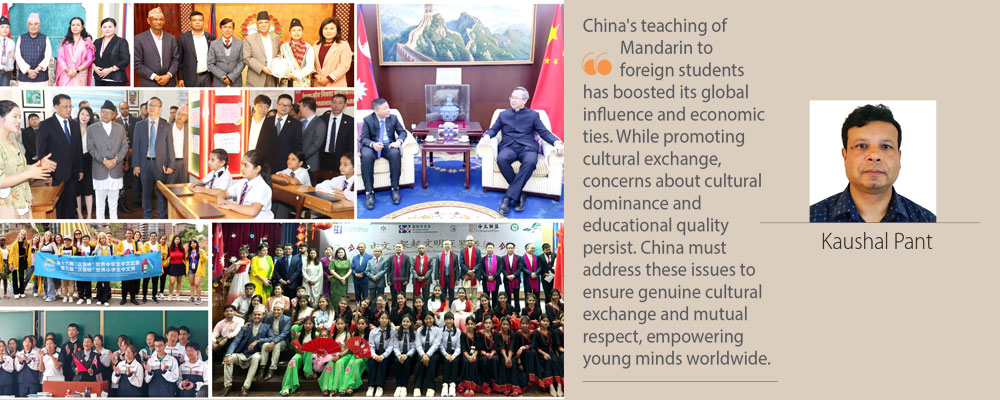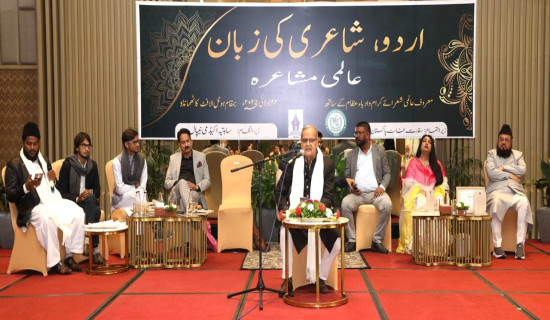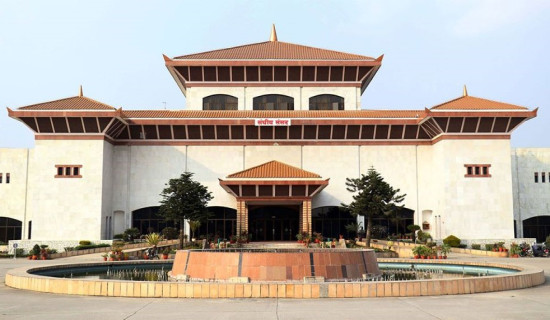- Wednesday, 23 July 2025
Embracing Chinese Language
Language is a medium of communication, and not just any medium—it's one of the most used and effective ways to communicate. Among the 7,164 languages that are spoken around the globe, one that stands out from the others because of its beauty in both writing, speaking and its rich and vibrant history is the Chinese language. It is believed to have originated from the Shang dynasty of ancient China around 3,000 years ago. Since then, it has transformed and evolved with the times and the people who speak it. However, the modern Chinese language as we know it only came into existence during the brief period between the last standing monarch dynasty, the Qing dynasty (1644–1911), and the early Republican era (1912–1949).
In recent years, China has risen as a superpower, not just economically but also in education. It currently holds the top spot for the most native speakers of a language worldwide, with a staggering 1.3 billion native speakers. The influence of the Chinese language is expanding beyond borders, impacting countries worldwide. Nepal is one such country profoundly influenced by the language. Esteemed educational institutions like Tribhuvan University, Kathmandu University, and L.R.I. Schools have introduced Chinese language subjects into their curricula.
China has been dedicated to enhancing the quality of education for Nepal's youth through Chinese language learning. The Chinese language has proven to be a vital bridge and platform for fostering mutual understanding among students from both countries.
Chinese Ambassador to Nepal Cheng Song emphasised that the Chinese language, with its rich cultural heritage and wisdom, stands as one of the world's most widely spoken languages. He described it as a valuable public asset offered by China to the world, serving as a vital bridge connecting diverse cultures and fostering global harmony and prosperity. Ambassador Song praised the strong support from the Nepali government and various sectors for the promotion and spread of the Chinese language in Nepal.
By learning Chinese, Nepali students not only enhance mutual understanding and friendship between the two nations but also gain a newfound appreciation for the support and guidance China has provided to our nation. The Chinese language skill provides a platform for Nepalese students with various opportunities to experience China's culture and development through further career-based academic scholarships.
For the past 12 years, the LRI Confucius Classroom (LRICC) has been offering professional Chinese language classes to students from grades 1 to 12. Director Wu Yuan mentioned that the students have displayed keen interest in the classes and have been attentive learners. She also noted that BICC and LRICC are adapting to technology, providing both online and offline classes. This active involvement by the children appears to be advantageous for their future.
The students have opportunities to visit and explore China's unique culture in summer camps, exchange programmes, and various global competitions. Nepalese students have achieved remarkable success in the global competition organised by China. The Chinese language learning programme has proven a great example of the power of language learning and the positive impact it can have on individuals and societies.
The principal of LRI School, Dr. Devkant Joshi, shared his views: The success stories of LRICC talk very highly about our achievements in globalising China by popularising its rich language and culture. In essence, our Nepali life has been immensely impacted by supportive Chinese outreach through language promotion, apart from developmental partnerships.
The People's Republic of China has been playing a significant role in Nepal's infrastructure development, mainly in the construction of roads, buildings, airports, industries, and information technology, as well as providing grant support and soft loans, for a long time. For generations, this partnership between the two nations has been bound by historical events, geopolitical mutual interests, people-to-people connections, and ideas of shared economic benefits, which has set an example of quality friendship for the entire world to witness.
It is clearly evident that China has always contributed to the sustainable development of our nation with a big heart. For example, as a grant, China built a trolley bus service in Kathmandu 50 years ago, which proved to be a reliable source of connection between Tripureshwor, Kathmandu, and Suryabinayak, Bhaktapur. This 13-kilometre-long trolley bus was a state-of-the-art project, mainly focused on eco-friendliness and long-term sustainable development.
In the current time, global warming has become one of the most prominent issues that has threatened the existence of mankind itself, but this 50-year-old concept of trolley bus service shows the commitment of the Chinese government and their shared long-term vision to combat climate change by avoiding the excessive use of fossil fuels in Nepal. As of today, our country relies heavily on fossil fuels, and this nonrenewable and non-eco-friendly source of energy is imported from foreign countries, which has resulted in an ultimate trade deficit and a dilapidated economy.
China's teaching of Mandarin to foreign students has boosted its global influence and economic ties. While promoting cultural exchange, concerns about cultural dominance and educational quality persist. China must address these issues to ensure genuine cultural exchange and mutual respect, empowering young minds worldwide. In conclusion, the Chinese language has forged a bond of friendship, unity, and commitment between our two nations. Let us embrace the Chinese language and culture and join China on its path to economic prowess. By applying what we learn, let's guide Nepal and all Nepali towards a brighter future.
(The author is a freelance writer and journalist.)











-original-thumb.jpg)





